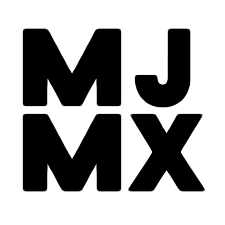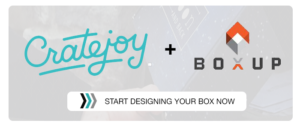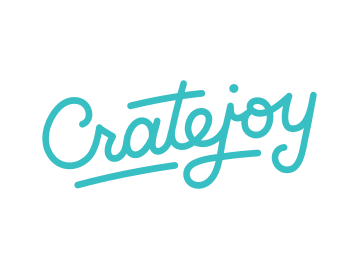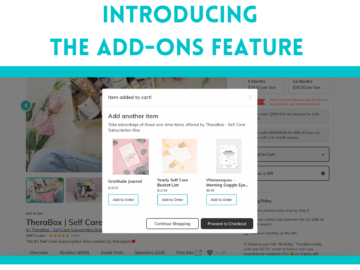Getting a subscription box business up and running is easier said than done. Like any business, subscription box services come with a whole host of moving parts: branding design, marketing, web hosting, order tracking and fulfillment, customer service, packaging, and shipping.
Specifically, we’ll dive into…
- Design services
- Photography
- Virtual assistants
- Email service providers
- Customer service helpdesks
- Social media services
- Custom packaging, and
- Shipping carriers
For that reason, we’ve compiled here a breakdown of different services you’ll need to succeed, as well as resources for each. Take a look below.
Cratejoy
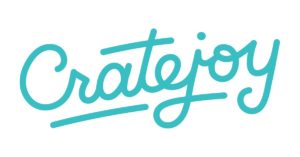
As the Internet’s only all-in-one ecommerce solution for subscription boxes, it’s a no-brainer that we include ourselves on this list. Cratejoy offers a bundle of features that you can’t find elsewhere. We offer marketing assistance, built-in customer relationship management (CRM), fulfillment logistics, analytics and cash flow reports, and tons of integrations for the new sub box entrepreneur. And for those of you with your storefront elsewhere, we can offer a streamlined, branded checkout process and backend support through our Hosted Checkout plan.
In short? Cratejoy is all set up to take your business where it needs to go.
Design Services
Every business needs branding. And that means you (likely) need a graphic designer. Here are just a few places you can find a designer of your own:
Looka
Formerly known as Logojoy, this service allows you to create a custom logo on your own, using their step-by-step walkthrough. Enter your company name and select a few sample designs you like, then choose a few representative symbols, and the site designer will generate a dozen logo designs for you to consider. You can edit the designs as you like and buy the sample design for $20 to revise it with your own graphic designer––or upgrade for a full set of branding images with multiple file types, color schemes, full ownership of your logo, and a master doc of brand guidelines. This site would work great if you’re looking for a starter logo.
Mojomox
This logo maker service is a little simpler than Looka––no iconography here––but it’s also free for users and offers sample branding across platforms. They’ll even suggest options for color schemes based on color theory, using your choice of a branded font color to start. You can get a free logo for your business and see what your new branding and color scheme would look like on your website, in mobile view, on business cards, and even get the hexadecimal codes for your company’s individualized color scheme. If you’re not ready to shell out money for the packages offered by Looka, and you’d like a gorgeous streamlined logo, Mojomox is worth a look.
Fiverr
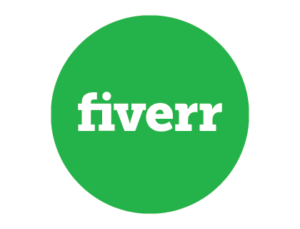
Businesses seeking freelancers on demand can find a whole host of them here, specializing in everything from logo and packaging design to programming and translation. The site offers you options to filter for designers more relevant to your needs by asking prompts like “Do you have [a] specific design in mind?” and “Tell us a little more about your brand’s personality.” Available designers are sorted by design style, list their going rate per project, and include a portfolio, so you can determine who’s right for your business.
99designs

This site serves a similar function as Fiverr, but for designers only; it’s a design contest marketplace for freelancers. Business clients looking to hire a designer (for a logo, branded website, promotional materials, or another project) write a “design brief” to summarize the project and set a payment rate (the contest’s “cash prize”). Designers see the design brief on 99designs and submit designs to the client for consideration. The winner receives the preset payment and the client keeps the design’s copyright.
This is great for entrepreneurs, who can check out an array of options rather than working with one designer alone. However, the going rate here will, potentially, run much steeper than Fiverr––logos start at $299.
Product Photography
If you don’t have photos of your product, you may as well not have a product! Research has shown that the majority of customers make purchasing decisions based on a product’s appearance. So it’s crucial not only to show your customers what your subscription box looks like, but to do so well.
But how do you find good photographers? Well, there are a couple options.
Cratejoy’s Recommended Photographers
Cratejoy has partnered with select photographers, experienced in lifestyle product photography, to offer an exclusive photo package and one-on-one consultation for Cratejoy merchants. Take a look at the work of Branded Boss Lady, Becca Bond (of SubscriptionBoxPhotography.com), Mindi Westhoff, and KYN Photography here.
Local photographers
Check Yelp and Google reviews for product (or “commercial”) photography studios in your area. Alternatively, you might post an ad for photographers on a university job board or coffeeshop bulletin board. This tactic could help you work with a less expensive photographer looking to build up their portfolio––and save you in startup costs. In either case, make sure you find someone who’s accustomed to photographing objects, not portraiture.
Tip: Talk with your photographer beforehand about what kinds of photos you’d like to shoot. Our article on how to take product photos will give you an idea of where to start.
Virtual Assistants
A virtual assistant is exactly what it sounds like: an online administrative assistant who works for you remotely. These jack-of-all-trades roles can include social media management, email correspondence, managing your business calendar, product research, and much more. Here’s where you might find one:
FlexJobs
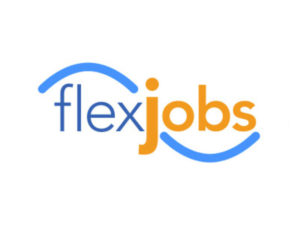
This job site––a professional search engine curated for freelance, remote/telecommute, and otherwise “flexible” work openings––includes myriad opportunities for virtual assistants. In addition to searching and applying to jobs on the site, job seekers can also research companies and take professional skills tests to broaden their skill sets. FlexJobs does not offer free memberships, either, so you know that whoever you find through the site is serious about their career opportunities.
Upwork
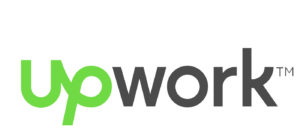
Another freelance marketplace, Upwork specializes in professional opportunities for white-collar work like web development, copywriting, and office administration. The site offers three membership plans depending on the size of your business: Standard, Pro, and Enterprise.
Upwork will filter for prospective workers that best suit your needs; after that, freelancers offer bids for your project. You choose the winning bid, then collaborate with your new assistant in a secure online workplace provided by Upwork.
Email Service Provider (ESP)
Whether you hire a virtual assistant to handle email correspondence or you’re doing it yourself, an expansive email service provider––one that’s designed for marketing––is imperative to success. Check out some of the most popular options for ecommerce below.
MailChimp

MailChimp is the preferred service for easy integration with Cratejoy. A titan in the field, MailChimp is the world’s “largest email automation platform.” No wonder: MC offers a ton of benefits for businesses trying to scale. For example, integrations to create ad campaigns through Facebook, Instagram, and Google; marketing analytics; a comprehensive mobile app; and designer templates.
Their free plan offers up to 12,000 emails a month, but tech support is only available for the first 30 days. Paid plans start at $10/month and offer unlimited emails (and support).
Klaviyo

This provider offers “enterprise marketing” for small (non-enterprise) businesses, so you can grow your business with ease. They offer tons of integrations, from CRM software to helpdesks, feedback software, and rebilling apps. There’s also website tracking, as well as advanced segmentation options to target your audience and email campaign personalization.
Klaviyo is free for up to 250 contacts, then paid plans start at $25/month and scales from there.
Drip

This email marketing client is designed specifically for drip campaigns, automated emails that go out to a filtered segment of your customer (or lead) base. As a result, its strengths lie in personalization––you can customize emails for individual leads to convert them into subscribers, or regain subscribers who have grown distant.
If your business has >100 subscribers, you can sign up for Drip’s free membership plan. Otherwise, paid plans start at $41/month depending on the size of your business.
Emma
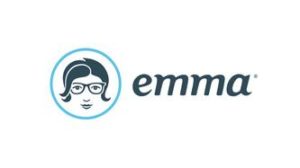
The big advantages of this email provider are that Emma emphasizes A/B testing––so you can try variations of the same email on different segments of your audience, to see which works better––and personalized drag-and-drop design. Their analytics offerings include a heat map to show exactly where your customers are clicking through on your emails, which could be extremely useful.
A downside, however, is that Emma costs more. Pricing starts at $89/month for their Pro plan (ideal for small businesses) and scales up from there.
GetResponse
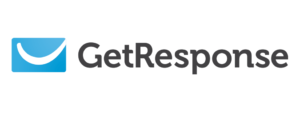
This is another of the more popular options for ecommerce email marketing, and it’s easy to see why. GetResponse offers easy drag-and-drop designer templates to customize your emails, a unique feature that allows you to send emailat the same local time around the world, and numerous ecommerce integrations to help you upsell, win back, or otherwise follow up with customers. They also offer webinar marketing as a way to connect with your audience, which is unique to their service.
Pricing starts at $15/month for 1000 contacts or under, then scales from there. For small and medium businesses, GetResponse recommends their $49/month plan, which includes a free email marketing consultation (worth $199).
AWeber
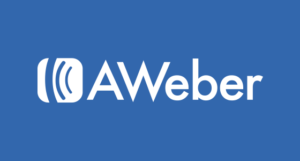
This ESP is perfect for the beginning email marketer, with simple-to-use templates and time-saving shortcuts. AWeber markets itself as the solution for “time-strapped” entrepreneurs, offering 24/7 telephone support and educational resources for business owners. Like the others we’ve discussed, they offer advanced audience segmentation and a drag-and-drop builder to design emails. Additionally, AWeber includes a suite of mobile apps to track analytics, grow your email list, send custom newsletters, and respond to customers on the go.
For businesses with ≥500 subscribers, pricing starts at $19/month. All plans include the full range of AWeber’s features; prices increase the larger your subscriber base.
Customer Management Systems
By now, you’ve got the marketing angle down. But how do you respond when the customers you’ve eagerly courted have a problem with your service? Setting up a strong, efficient customer management system could be the difference between making that customer’s day and losing their business. Read on for some popular options.
Zendesk
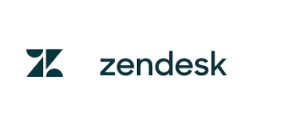
Zendesk is the king of customer management for a reason: it simplifies the system of interactions that makes up customer support. Live chats, social media queries, telephone support, and knowledge guides are all gathered in one place under the Zendesk Suite, helping you see the customer’s history and solve their problem easily. It’s also designed to scale with your business.
Their Professional plan runs $89/month, while the Enterprise plan is $149/month.
Salesforce
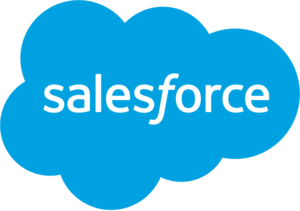
This software offers strong customer relationship management (CRM) and builds from there, offering dozens of app integrations. Its Cloud Essentials bundle is set up to be an “out-of-the-box” solution for small businesses seeking to scale. Moreover, they offer new clients 3 months of G Suites for free. However, their site doesn’t allow you to view a product demo unless you sign up.
Pricing starts at $25/month for up to 5 users; more users will net you $75/month.
Freshdesk

This virtual helpdesk customizes service based on your needs. Like Zendesk, Freshdesk makes it easy by keeping all relevant customer info inside one support ticket. A built-in “discussion pane” allows you to seek assistance from your team members on certain support issues, while their metrics panel tracks support efficiency and effectiveness. You can also customize your automated responses for customers around the globe, so subscribers feel assured there’s a person behind the computer.
Freshdesk offers a free “Sprout” plan for brand-new businesses, then goes up to $19/month for small business teams.
Social Media Tools
Hootsuite
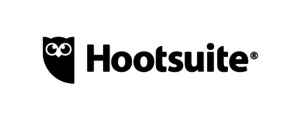
This service helps you schedule your social media posts across platforms – even hundreds of posts at once. In addition, Hootsuite offers the chance to curate found content for reposting/sharing through an automated content library. Features like a social content calendar, analytics, and social media monitoring (to stay current on trends) allow your business to engage more easily and frequently with your subscribers and leads.
Their single-user plan costs $29/month, while team-based plans start at $129/month.
Linktree
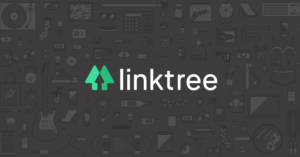
While Linktree is an Instagram-specific client, using their service can offer huge benefits to your business. Instagram is arguably the biggest social media site out there right now in terms of marketing, and the ability to gather all your content in one place is essential. That makes it possible for newer followers to see your content history––and access your site based on everything you’ve done, not just your most recent post.
Luckily, Linktree is free for users.
Buffer

This service allows you to view all your social media accounts in one place. Set up your posting schedule once, and as you add more content to post/share, Buffer will slot them into your predetermined timeline. Furthermore, they offer an RSS feed, browser extensions, and apps for Android/iOS to share content in real time.
Buffer offers a free plan for up to 30 posts a month, while paid plans begin at $15/month for 800 posts. Read more about Buffer on our blog.
Custom Printing Services
You’ve got your digital marketing and customer support underway, but all of that amounts to little without an actual product. Custom printers will help you get your branding on during that crucial unboxing moment. Check out our recommendations below.
BoxUp
Through Cratejoy’s partnership with BoxUp, Cratejoy merchants earn 15% off their first order and 5% off for life. Pick the packaging type you need––anything from padded mailers to large delivery boxes – and design your branding. BoxUp offers a library of design templates to play with, or you can upload your own design. Orders can be as little as 12 boxes or as large as 2000.
Lumi
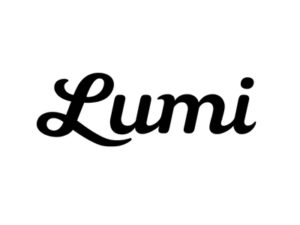
Another packaging merchant, Lumi offers a variety of products to meet your needs. The dashboard gathers all your information on packaging orders and saves your design proofs to the cloud, making it easy to access (or tweak) your branding. It also offers accounting software to manage manufacturer invoicing.
Sticker Mule

As you can guess from the name, Sticker Mule specializes in custom stickers and labeling, which provides a unique (and affordable) option for branding your product. Moreover, they offer 4-day turnaround on order fulfillment and free shipping.
Read more: Check out our Unboxed series to see how Scribbler used Sticker Mule to boost their brand.
Noissue
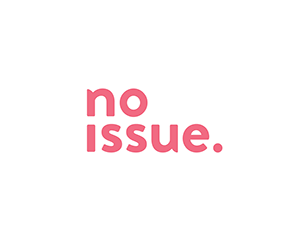
This company offers customized tissue paper for packaging and gift inserts. Upload your branding (or preferred pattern), then design the tissue paper yourself through their easy-to-use platform. They include free shipping and returns––and to top it off, the paper (and ink!) is eco-friendly.
Packlane
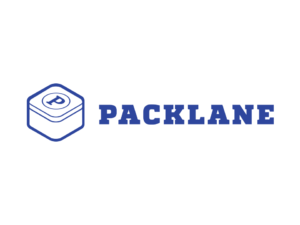
Plan your custom-printed packaging with Packlane, which offers three container styles – box, mailer, and carton – for your products. You can customize the size of the container as well as its outside, and order as few as 1 box to try it out. They’ll even let you choose your box material.
Brand in Color

Like Packlane, Brand in Color offers three container types (including pizza-style boxes!) for shipping subscription boxes. Their prices are affordable, and you can customize your box with your own branded design through their website. Minimum orders start as low as 25.
Fulfillment Services
It’s a common rule of thumb to keep your fulfillment process in-house until you reach 300-400 subscribers, as it’s easier to manage with a small batch. But when your business does scale up, what’s the best approach for outsourcing? Let’s take a look.
Interns
Hiring a small team of interns to handle fulfillment may be the best of both worlds if you have a few hundred boxes to pack, label, and ship. This is a nice compromise between doing fulfillment yourself and outsourcing, as you’ll be able to keep an eye on goings-on while you work on other aspects of your business.
Local fulfillment services
Searching for fulfillment warehouses on Yelp or Google can net you some excellent finds. (We recommend Northwest Paper Box for the Pacific Northwest region.)
ShipBob

ShipBob may sound like a shipping-only service, but they actually focus on complete order fulfillment. They’re set up to integrate with Cratejoy and Shopify, too. So you can import your orders automatically and ShipBob’s local fulfillment centers, wherever you are in the U.S., will pack and deliver your order within two days.
Shipping Tools
Your orders are packed ready to go and your customers waiting for their monthly surprise. All that’s left is to ship them out: the most important step of all. Check out some stellar shipping services for ecommerce below.
ShipStation

There’s a reason why ShipStation is the #1 choice for ecommerce sellers. Their shipping software helps you manage orders, track shipments and inventory, and automate shipping options all in one place, simplifying the logistics process. In turn, this makes for more efficient shipping. You can batch-print labels if you do in-house fulfillment, too, and receive massive discounts for common carriers.
ShipStation organizes their membership plans by size; plans start at $9/month for 50 orders.
Pirate Ship
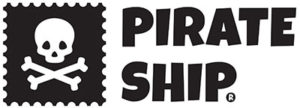
If you intend to ship through the postal service, Pirate Ship may be for you. Members can save up to 89% off USPS shipping rates by using Pirate Ship’s free shipping software. You can also weigh packages and print postage labels at home, so you no longer have to wait in line at the post office. The software integrates easily with Cratejoy, as its batch shipping features are ideal for subscription boxes.
Stamps.com

Like Pirate Ship, Stamps.com specializes in at-home postage labels. One benefit of Stamps.com is that they send you a free digital scale to weigh packages; a drawback is that, unlike Pirate Ship, the service isn’t free. If you want to sign up, a plan will run you $19.99/month after a 4-week free trial.
More Resources
For more tips on starting, operating, or scaling a subscription box business, take a peek at Cratejoy’s blog and resources for merchants.


